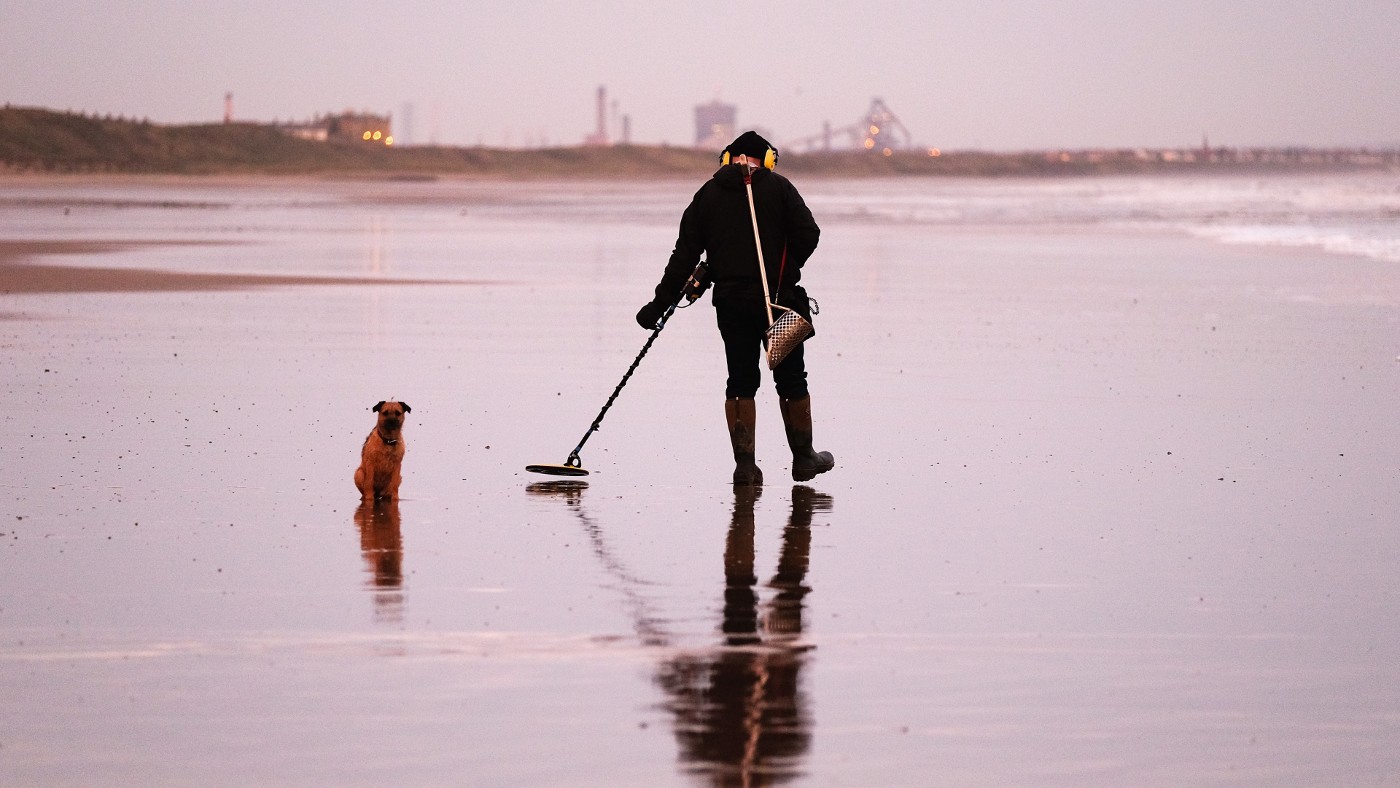The laws of finding – and keeping – treasure in Britain
Amateur archaeology is on the rise but flouting the laws can land you in prison

A free daily email with the biggest news stories of the day – and the best features from TheWeek.com
You are now subscribed
Your newsletter sign-up was successful
Napoleon famously described Britain as a nation of shopkeepers, but "were he alive today, he might revise that to a nation of amateur archaeologists", said National Geographic.
Armed with trowels, boots and metal detectors, "rank-and-file Britons" are "digging up their island home" in record numbers "in search of buried treasure", said the magazine. Yet while "staggering quantities" of ancient gems are being uncovered, strict laws govern what should be done with them.
Record finds
A 3,000-year-old gold dress fastener found in Staffordshire was among the record 1,384 bona fide treasure finds in 2022, according to latest data from the British Museum's Portable Antiquities Scheme, which logs archaeological discoveries. It was the ninth consecutive year that more than 1,000 discoveries were logged.
The Week
Escape your echo chamber. Get the facts behind the news, plus analysis from multiple perspectives.

Sign up for The Week's Free Newsletters
From our morning news briefing to a weekly Good News Newsletter, get the best of The Week delivered directly to your inbox.
From our morning news briefing to a weekly Good News Newsletter, get the best of The Week delivered directly to your inbox.
A 10-year-old from Gloucestershire has contributed to this year's total, after he discovered a rare, 700-year-old seal just five minutes into his first metal detecting event. The boy, named only as Brodie, told BBC's "Newsround" that he dreams of "finding something really big, like a horse and carriage, or something like gold jewellery or Roman swords and hats".
What the law says on such finds
There have been "issues with rogue detectorists", said The Independent, including "continuing reports of 'nighthawkers' who raid ancient sites after dark". Police "stepped up patrols" along Hadrian's Wall after illegal metal detectorists were spotted working in the area.
Under British law, any find over 300 years old and containing more than 10% gold or silver must be handed to a representative of the Portable Antiquities Scheme. Curators at the British Museum then study the object and produce a submission to the coroner's court, which makes the final judgment on whether the find meets the legal definition of treasure.
"If it does", said National Geographic, "the find becomes crown property, available for local or national museums to purchase for the public benefit." An independent valuation is made and the finder shares the market-value fee with the landowner on whose property the find was made.
A free daily email with the biggest news stories of the day – and the best features from TheWeek.com
Penalties for not reporting treasure can "be severe". Two men appeared in court in Durham last year charged with attempting to sell 44 extremely rare silver coins from the reign of Alfred the Great. The coins were part of a "Viking hoard" that they had unearthed in Herefordshire years earlier, and were said to have been worth millions.
Roger Pilling, 75, and Craig Best, 46, were caught in an undercover police operation trying to sell the coins, said The Guardian. The monetary value of the coins was estimated at £766,000, but instead of a "jackpot payday", said National Geographic, the two men each got five years in prison.
The previous year, metal detectorists who stole a £3 million hoard of Anglo-Saxon buried treasure were ordered to repay £1.2 million between them "immediately", said Mail Online.
Resentments and jealousies
Nearly all finds in the UK are made by amateurs. The most recent figures show that professional archaeologists account for only 3% of findings, which "underscores what a significant contribution the general public is making to the field of archaeology", Michael Lewis, the British Museum's head of treasure and portable antiquities, told National Geographic.
Although academics might harbour "resentments and jealousies" about the successes of amateurs, any ill-feeling is "tempered" by the fact that nearly all of their finds would never show up in an archaeological excavation. "Most of these finds are made on cultivated land," said Lewis. "If metal detectorists didn't find them, they'd just be lost to plowing."
Chas Newkey-Burden has been part of The Week Digital team for more than a decade and a journalist for 25 years, starting out on the irreverent football weekly 90 Minutes, before moving to lifestyle magazines Loaded and Attitude. He was a columnist for The Big Issue and landed a world exclusive with David Beckham that became the weekly magazine’s bestselling issue. He now writes regularly for The Guardian, The Telegraph, The Independent, Metro, FourFourTwo and the i new site. He is also the author of a number of non-fiction books.
-
 How the FCC’s ‘equal time’ rule works
How the FCC’s ‘equal time’ rule worksIn the Spotlight The law is at the heart of the Colbert-CBS conflict
-
 What is the endgame in the DHS shutdown?
What is the endgame in the DHS shutdown?Today’s Big Question Democrats want to rein in ICE’s immigration crackdown
-
 ‘Poor time management isn’t just an inconvenience’
‘Poor time management isn’t just an inconvenience’Instant Opinion Opinion, comment and editorials of the day